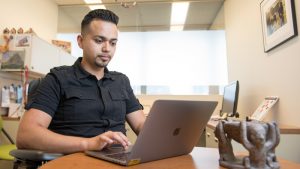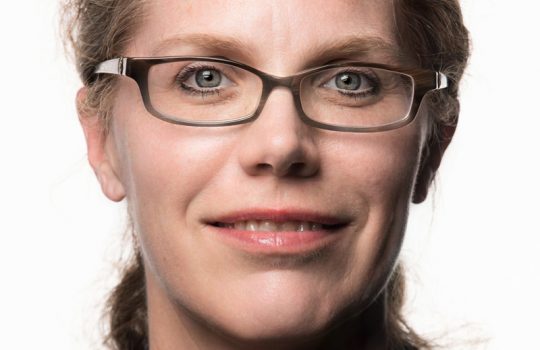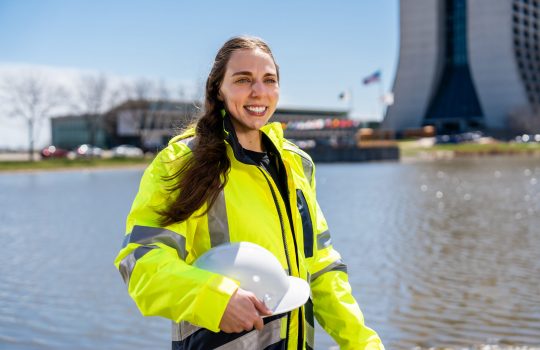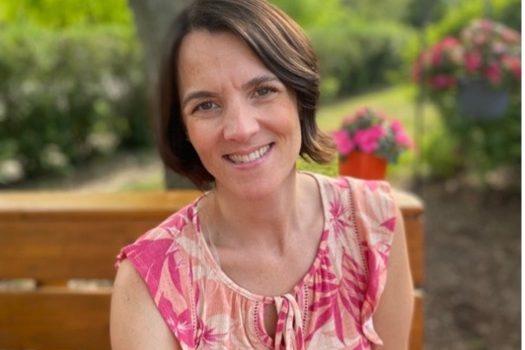What was your first visit to Fermilab like?
In April 2017, I brought my daughters to Fermilab for a conference held by a community organization called Dare to Dream, which works with middle-school Latinas to inspire them to pursue and explore STEM careers. If you’ve never been to Fermilab, it feels like you’re stepping into another world. It has its own architecture, the bison — everything is just very different.
At the time I was the assistant director of the UIC Latino Cultural Center, and I was helping the coordinators with tabling and distributing information when Nigel Lockyer started talking to me. I didn’t know he was the director of Fermilab at the time. I told him I was bringing my daughters to this conference, and he showed me videos about the work at Fermilab and what they do.
What do you do here – what’s your typical day like?
I help coordinate the leadership of the laboratory resource groups. These are groups that serve different community members and help them organize and advocate for better representation in the workforce. It’s a lot of in-reach and outreach events. We currently have 10 different groups that I am accountable for to make sure their leaders are working toward their mission and vision.
For example, we have a newly formed Fermilab Young Professionals group. We have to acknowledge that, like many other national labs, there’s an aging workforce at Fermilab, a workforce that has done a lot for all of us. As a lot of younger folks are picking up from where they are leaving off, it’s obviously something we have to think about. We don’t want all that knowledge to just leave Fermilab. We want to pass on all that knowledge. And so, investing in every generation in the Fermilab workforce is important.
How do you bring an inclusive approach to a science environment?
We have the Fermilab community standards that we choose to abide by. These are very basic principles of respect. We all come from different backgrounds, and have different ideologies and beliefs, but at the end of the day we’re here to learn from each other. We respect each other’s differences whether we agree with them or not, and do our best to do what we do, which is research — and sharing that story of research with the public.
I think we’re living in a very challenging time in the 21st century, where sometimes we feel like every conversation is very politicized. And sometimes people try to take politics out of the conversation, but I think if we look at even the root of democracy, you can’t have a democracy without politics. It’s not actually a bad thing, it’s just that everything is so polarized right now that it’s hard to find compromise.
At Fermilab, we live in this little wonderful world, but at the end of the day, people come from the outside world. Even though Fermilab has a very international flavor to it because of the nature of our work and our partnerships with so many countries, we are a microcosm of what’s out there. Any conversation or issue that happens out there, happens here. So, again, we practice respect, as everyone at the lab should.
What’s your favorite thing about working at Fermilab?
I really like the internship programs. I am the TARGET program coordinator. This is a six-week paid internship for Illinois high school students that is geared toward diversifying the STEM pipeline. It’s about providing opportunities to underrepresented communities in STEM. That is my favorite part—doing a lot of the outreach, working with community members, teachers and counselors, and really being able to provide those avenues. I enjoy coordinating the program infrastructure for the high school students and helping out with the other programs for the undergrads and grad students.
What do you like to do when you’re not at work?
I’m in a co-ed soccer league with my wife. We’re on the same team. I tend to look at everything through a social justice lens, so even the fact that I’m in a co-ed soccer team speaks to that. Our team is called the Oak Park Tigers, and we’re very intentional about our diversity. We have every type of identity you can think of, and I think we have an amazing dynamic.
What’s something your colleagues might not know about you?
I love camping, biking and soccer. Anywhere there are trails and breweries is always fun to visit, because you get to interact with nature and enjoy craft beers. For the last few years I’ve been going to a little town in Wisconsin called New Glarus. The first weekend of June, they have a beer, bacon and cheese festival. I’ve been going since it started about five years ago. It’s one of my favorite destinations because it involves a festival and has a lot of cultural heritage. It has a feeling that’s kind of similar to Fermilab, where it’s close by, but you’re going into another little world of its own.




